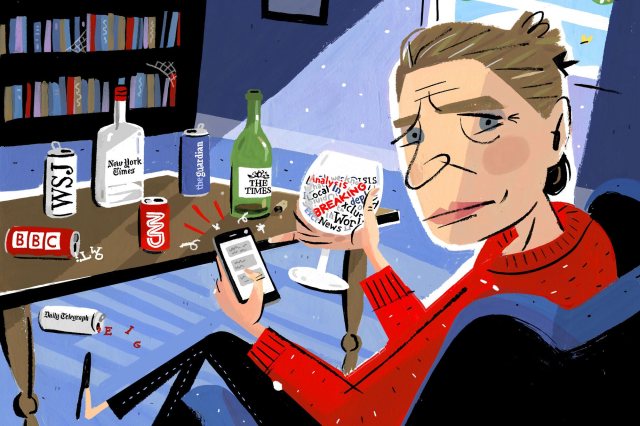Illustration by Stephen Collins

This is part 2 of Lionel Shriver’s ‘I am a news-aholic’, click here to read part 1.
How to be a better news consumer
I’ve developed a few rules of thumb to mitigate the wastefulness of my addiction. Because, for any addict, tinkering around the edges – taking one less slug of those two bottles of vodka – is doomed to failure, I rarely obey these guidelines. That doesn’t mean they’re not good rules:
- Resist process stories when you only care about the result. Take elections. For those of us who follow political races the way horse fanciers do the Grand National, elections are entertainment. But if policy U-turns, interview gaffes, inaccurate polls, and vicious recriminations are not your idea of fun, skip the lot. Go to bed early on Election Day. Wake up and find out who won.
- Resist stories about what might happen. Most of it won’t. This includes policies that a government is “considering”, and an endless string of “promising” studies that might lead to a cure for cancer, ageing, psoriasis, hair loss, depression, and a crap sense of humour. You will never hear about most of these nostrums again. For that matter, regard all “studies” (“Research reveals women really are terrible drivers”) with suspicion. Methodology is all, and most of the time said-study was conducted on dung beetles, only six of which agreed to take part. Short-staffed newspapers are highly dependent on “studies” that arrive unbidden to fill out the lead section.
- Be discerning. To respect your time is to respect yourself. With news in print, taking a moment to determine whether you’re really interested in an article can seem like more bother than going ahead and reading the damn thing – but the effort repays itself. To this end, it helps to deliberately interrupt your concentration. As a giving-a-shit test, I sometimes look away, only to return to the article and suddenly realise, Oh! I don’t care about Moldova! Purposefully disrupt the mindless, habitual grind through a publication just because it’s there.
- With TV programmes, use fast-forward. All news junkies should put news programmes on series record, to elide both adverts and earnest panels droning on about another feeble educational initiative. Personally, I never want to watch another interview with Diane Abbott. Think of that TV remote as the electronic equivalent of Dorothy’s shoes.

- To hone discernment, experiment with consuming old news. Information of enduring value will be just as fresh and pertinent a week later, if not a month or a year later. The stuff that dates within a day or so you could probably live without altogether.
- Don’t double up. Social media, websites, TV, and print constantly replicate the same information. You can end up consuming the exact same news repeatedly in different formats.
- Don’t use talk radio or 24-hour news channels for background chatter. Put on some music. In other words, pay attention, or do something else. Too often, I only half-listen (“half” = not listening) to TV news – which is more pointless than being utterly riveted by Judge Judy.
- Discard this notion that news is necessarily a productive use of time. The news habit is indolent. News for me is clearly a method of filling time, if not killing time, in a manner that I have persuaded myself is not shameful. But when unthinking – when amounting to a kind of sleep-walking through tracts of your day – news OD is no more noble than lying in the gutter with a needle in your arm.
The benefits of news consumption
Given the precariousness of contemporary journalism, this is an obtuse juncture at which to encourage its shrinking customer base to desert en masse. I may poo-poo the idea that news neurotics like me are motivated by civic duty, but reliable, responsible, and respectably funded reporting really is critical for democracies, and critical to the world I wish to inhabit. We’ve been a little hard here on us news junkies, so let’s conclude with our redeeming qualities. I’ve flirted with cold turkey, but I know myself: I can’t do it. I don’t really want to quit. (This is where my fellow sick puppies in the church basement withhold their biscuits.)
It’s a pleasure to begin the day concentrating on something. That Telegraph could be Voltaire instead, but I don’t want to get out of bed and plunge right into Voltaire. Newspapers require a serial concentration that’s not too demanding. Moreover, there’s a convivial aspect to this ritual. I share choice titbits with my husband: “Did you know one in six Canadians is now foreign-born?” or “Finally, The Times has stopped promoting this paranoid, classist idea that the new cladding on Grenfell Tower was ‘to make the building more attractive for wealthy onlookers’.”
For both my husband and me, news supplies a medium through which to express ourselves and explore what each other believes. When shy of catastrophic, news is play – novel material to joke about, to rail against, and to fight over. It’s fun.
The news also places us all into a larger context, and binds us, however tentatively, to a larger collective existence, one full of incident and moment, even when our own lives are deadly dull. Granted, this cheap form of “community” doesn’t threaten to put us in contact with actual other people. But in theory, it should still make us more empathetic. Because I’m something of a loner, if not a misanthrope, my sampling of second-hand pathos at least beats grumpy isolation. The news keeps me company.
When I do venture out, the news gives me a passel of subjects about which friends and strangers alike are also clued up, so we always have something to talk about. I cheerfully use the news as a social crutch.
Inferior retention may be infuriating, but after mainlining the news for most of my adult life, I’m better informed in a broad way, even if I don’t remember all the particulars. Over time, this ragbag of information has allowed me to build what I like to believe is a consistent political perspective, as well as a cohesive version of what makes people tick, even if in both instances these views are pretty bleak. (How much more of an optimist I might be if I spurned the news is a good question.) All the articles I think I’ve forgotten are rattling around in my head somewhere, and they have contributed to who I am and what I think.
For me, news provides ideas for fiction, a form that constructs simulacrums of just the sort of thing that happens to people in the news, just tidied up. For example, So Much for That was partially inspired by an article about how medical bills for people with health insurance were then the leading cause of American personal bankruptcies. Because the news is chock-full of you-could-not-make-this-up, novelists’ fiercest commercial competition by far is reality, which consistently outpaces – in outrage, in hilarity, in poignancy, in heartbreak – anything we might invent. Happily, by retouching here and there, we can help ourselves to current events, and any fiction writer who passed on all this free stuff would be a fool.
I eagerly follow some issues (demography, debt, immigration, Venezuela), while boycotting others (most sports, fashion, New York State politics, Israeli-Palestinian peace talks), because you simply cannot care about everything in the whole wide world. Yet the news can interest me in subjects about which I’d previously not given a toss. (Honeybees. Invasive carp.) Like concentration, interest is a pleasure in itself. Giving a shit feels better than indifference. As I age, I can feel the encroachment of a corrosive apathy that laps at my toes like an incoming tide of acid. To forestall that ennui, I slide into my usual news routine like pulling on wellies.
A natural polymath, I’ve a sentimental affection for the newspaper, in which I’m forever shopping for those tiny squib stories that crack me up. A few years ago I constructed a two-by-three foot collage of clippings, from the days when I mostly read hardcopy. Headlines include, “Woman sues for being born” and “Man kills wife for serving too many Brussels sprouts.” There’s a long article about a Briton who was arrested and prosecuted for barking at a dog. You can’t let gold dust like this slip through your fingers!
News is history in the making. Breaking news crashes like a wave that will never again hit the beach with the same distinctive curl. Each instant comes around once. Revisiting it as the past doesn’t feel the same as being right there when the eternal present is unrolling, and the verdict on absolutely everything is still out. The news allows us to participate in the real-time narrative of our species, our planet, our universe. I’m addicted to the news for the same reasons I read and write fiction: I love suspense; I love psychological puzzles; I love conflict, irony, contradiction, and even my own bafflement; I love story. My daily news fix always entails an element of excitement. I turn on an evening broadcast with equal parts anxiety and appetite. This is the big story, the only truly big story, comprising a virtually infinite number of smaller stories, one of which belongs to each of us. The news helps us to inhabit the uniqueness of this very moment, and thus to inhabit the uniqueness of our era, and the singularity of our own lives.









Join the discussion
Join like minded readers that support our journalism by becoming a paid subscriber
To join the discussion in the comments, become a paid subscriber.
Join like minded readers that support our journalism, read unlimited articles and enjoy other subscriber-only benefits.
Subscribe